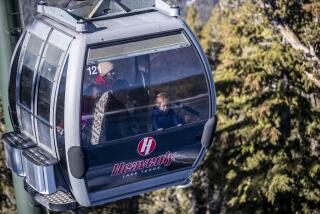Ski-Gondola Survivors Seek Justice in U.S.
- Share via
ATLANTIC BEACH, N.C. — Walking barefoot in the white sand by the gently rolling Atlantic surf, Marina Renkewitz tries to forget for a moment why she is here.
She and her husband of 26 years, Uwe, had made plans to visit the United States this year from their home in Germany. Uwe, a machine shop supervisor with a passion for sport and nature, had always wanted to visit Yellowstone National Park. And he loved the beach as much as the mountains.
“He was interested in everything beautiful in the world,” says Renkewitz, bending down to pick up a pink-speckled seashell.
But her visit to the United States is anything but a holiday.
When a U.S. Marine Corps jet sliced through the cable of an Italian ski gondola a year ago, Uwe was killed, along with the Renkewitzes’ 23-year-old daughter, Mandy, and her fiance. With her surviving daughter, Sindy, Renkewitz has joined family members of other victims who came to Camp Lejeune for the court-martial of the pilot, Capt. Richard Ashby.
“I was hoping that Ashby would look me in the eyes,” says Sindy Renkewitz, a 20-year-old college student. “But in the courtroom he just ignores the people behind him.”
‘Machinery Worth More Than a Life’
During a break in the trial earlier this month, Ashby’s mother, Carol Anderson, responded that her son does not mean to be cold. “Rich cares very much about the victims and their families,” she said. “I pray every day for the families.”
Ashby faces 20 counts of involuntary manslaughter, destruction of property and dereliction of duty for allegedly flying his EA-6B Prowler anti-radar plane too low and too fast during a training mission in Cavalese, Italy, on Feb. 3, 1998.
Ashby says the gondola cable sliced by the plane was not on his flight maps and claims his instruments tricked him into believing he was flying higher. His navigator, Capt. Joseph Schweitzer, is to go on trial next month.
The dozens of family members from Belgium, Germany, Italy and Poland were not here to testify. They came to draw attention to the fact that, while the U.S. government has paid $20 million to repair the Alpine ski lift, the victims’ survivors have been left to sue through the Italian courts in a process that could take up to 10 years.
“That’s bad that machinery is worth more than a life,” says Sindy Renkewitz. “We’ve lost people we loved.”
Family’s Anchor Lost in Accident
The family lost an anchor when Uwe and Mandy died, Marina Renkewitz says, sitting on a sofa in a beachfront condominium provided by the government, miles away from the noise of Camp Lejeune’s artillery practice and circling helicopters.
Uwe loved hiking, skiing and all outdoor sports. He and the other Germans in the gondola were all part of a local sports club.
But he also enjoyed more subtle pleasures. Like many German families, the Renkewitzes had a small country garden where they grew potatoes and strawberries, and tended cherry and apple trees. Above all, he loved his 50 exotic birds, many of which he had raised from hatchlings.
“He lived for that,” Renkewitz says. “He could spend hours on that.”
Mandy was a master at interior decorating, her sister says. She and her fiance, Michael Potschke, 24, who both worked at the regional employment office, had fixed up the former stable where they lived.
“They wanted to marry in the fall, and by December they expected to have a child,” Sindy Renkewitz says, fiddling with a tiny gold and diamond ring, Mandy’s, on her finger now.
Renkewitz wears another of Mandy’s rings. Her husband’s etched wedding band is on her left middle finger.
“Not much remains for us except this jewelry,” she says, her blue eyes welling with tears.
The Renkewitzes were not a wealthy family, but they were comfortable by the standards of the former East Germany.
“My father’s job was pretty secure,” says Sindy Renkewitz, a tall, thin woman with bleached-blond hair and her father’s brown eyes. “There was always enough extra money to go on vacation.”
Now Renkewitz is left to pay the remaining six years’ mortgage on her family’s apartment. She and her daughter don’t go to movies and restaurants. She has even sold the birds.
“It was terribly painful to have to sell them,” she says. “I considered a long time whether I should take up the hobby and carry on for my husband.”
John Eaves, an attorney representing the families of the seven German victims, has filed administrative claims against the U.S. government. But he and others are calling for a congressional appropriation like the one used to restore the Alpine ski resort. An attempt by Sen. Charles S. Robb (D-Va.) to include $60 million for the families in that bill failed.
“If there had been one American on that gondola, we wouldn’t be in this position,” says C. Torrence Armstrong, attorney for the Belgians.
Renkewitz sometimes dreams of the crushed gondola and the bloody snow. Had she not been souvenir shopping, she might have been on the ski lift as well.
She used to wish she had been.
“I’ve had those thoughts, that I should have been in there too,” she says. “But then I remember that I have another daughter at home.”
More to Read
Sign up for Essential California
The most important California stories and recommendations in your inbox every morning.
You may occasionally receive promotional content from the Los Angeles Times.













